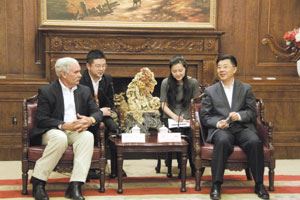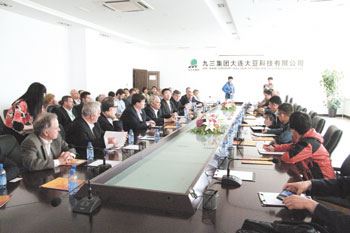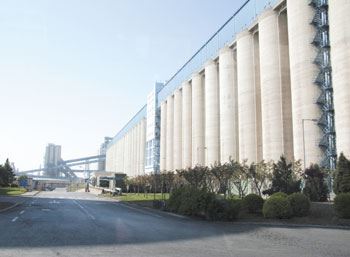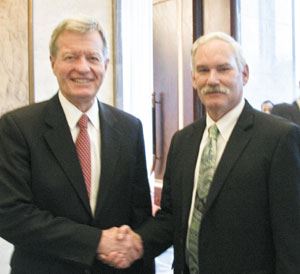|
A Push For US Agriculture
China – American Farmers Number One Agricultural Trading Partner
3rd In A Series
JOHN M. LAROSE &
BETTY VALLE-GEGG NAEGER
MidAmerica Farmer Grower
CHANGCHUN, CHINA
U.S. Under Secretary of Agriculture, Farm and Foreign Agricultural Services, Michael Scuse, led his second Agriculture Trade Mission (ATM) to China in May. During the trade mission, he sat down with John LaRose, Publisher, MidAmerica Farmer Grower. Scuse emphasized the importance of the trade mission and shared his personal agricultural background.
The Delaware farm native grew up on a farm that raised corn, soybeans and wheat. “I’ve farmed most all of my life and I was very fortunate in 2001 to be chosen by Governor Ruth Ann Minner to be the Secretary of Agriculture for the state of Delaware,” Scuse began. “Then in April 2009 I was asked by the Obama Administration to be the Under Secretary for the USDA and later I was nominated to be the Under Secretary of Farm and Foreign Agricultural Services and confirmed by the Senate.
His great-grandfather, Thomas Scuse, and grandfather, Clarence Scuse, bought the farm where his father, Clarence Scuse, Jr., was born in the 1920s. It's where he and his siblings were raised and where he plans to return when his stint in Washington is complete. His nephew, Christopher Scuse, lives there now, and his brother, Dale Scuse, operates the farm at present.
“I look forward to returning to the farm, it’s something I have always loved to do, I miss it,” he said. “My father thought I was crazy when I accepted the Secretarial position in Delaware but I felt an obligation to do something to help agriculture, to make a difference. That was important, to try to make a difference for our producers in Delaware and ultimately make a difference for our nation's farmers and ranchers.”
With the dirt still on his shoes, he manages to return to the farm on weekends when he’s not on a foreign trade mission.
“I still live on the farm that I purchased back in 1982, with my wife, Patrice, so I still go home and mow the pasture, mow the grass and do the garden and on a rare occasion, my brother, Dale, may let me on a tractor or combine. He thinks I’ve lost my touch but I can still do a pretty good job of running a combine.”

On his second Agriculture Trade Mission To China, U.S.
Under Secretary of Agriculture, Farm and Foreign Agricultural Services,
Michael Scuse,
meets with Dalian Vice Mayor, Lu Lin. Pictured from left to right is Michael Scuse, Lu Lin, and interpreters in the background.
Photos by John LaRose
The state of China trade depends on the type of product. The soybean industry, which has worked on trade with China for 20 years, has done an outstanding marketing job. China is the number one destination for U.S. soybeans. “Roughly 25 percent of the soybeans that are grown in the United States find a home here in China,” Scuse noted. “Think about that when you see a soybean field, every fourth row is destined for China. That’s how big this market is and how important it is for us. They’ve done a great job. We’ve also done a fairly good job the last couple of years at getting corn into the Chinese market. The U.S. cotton industry also has been successfully exporting to China.”

U.S. Delegation shown in a meeting with the management of Jiusan Soybean Crusher which is a large importer of U.S. soybeans.
On April 7, 2014 the U.S. swine industry lost access to China, the world’s largest pork consumer, due to a temporary restriction on hog imports, caused by the Porcine Epidemic Diarrhea Virus (PEDV). This is a market that has been open since the 1970s. Import permits will not be allowed until the two countries reach a new protocol agreement on testing for PEDV in pork.
“Since the Bovine Spongiform Encephalopathy (BSE) case in 2003, we have not been able to get beef products back into China,” he said. “That’s one problem we currently are working to change. China’s Vice Premier made a commitment to U.S. Secretary of Agriculture Tom Vilsack last November to open up the beef market to the United States this year." Scuse planned to press for that access the next week when he was to visit Beijing.
During his visit to Beijing, Scuse visited with representatives of the “Special Administrative Region of the People’s Republic of China.”
Scuse didn’t know if the beef the United States would export to China would be processed or frozen. “That’s hard to say because right now we’re shipping fresh milk from the United States. It depends on what the demand is, whether it will be frozen meat or fresh cuts, or sides of beef that will ultimately be processed here,” he explained. “I think at the end of the day, once we gain access to the market, we’re going to see a combination of all of those.” (See Editor’s Note at the bottom.)
“There was an issue with disease so citrus fruit from the United States was banned last year,” he reported. “We’re working to resolve that and I think, hopefully in the very near future, we'll have a resolution to that issue. There’s also been an issue with apples. We are going to regain access for Washington state apples this fall, and we’ve been told the end of the year we’ll have market access for all U.S. apples.
“There have been some successes as we opened up a market for U.S. pears last year. We also opened our market to their pears. We’re currently working on strawberries from California. Today at lunchtime we had some very, very good strawberries from China. California strawberries come on at a different time of year and won’t be competing. So that’s one of the things that we’re going to try to stress.”
China wants to get their apples into the U.S. market, and the United States now allows processed poultry products from an approved country that are being processed in China. However, China wants access for their slaughtered poultry as well, and that's one of the issues where some questions still need answers, so there are ongoing discussions on those issues.

Pictured is the Nissin Soybean Crusher Port Facility in Dalian, China.
The US Rice Producers Association has worked hard since 2006 at opening the market in China for U.S. produced rice. Presently the phytosanitary protocol is in China’s hands waiting for approval. This is potentially a large market since U.S. rice production is equal to approx. 1 percent of China's consumption each year.
While the large commodity organizations are organized and seeking markets in China, the small U.S. agricultural business could benefit as well from these trade missions.
“That’s one reason why we do these trade missions,” he said. “We target small and mid-sized companies because they don't have the resources to get the business connections here that they need. With these trade missions, we’ll get the small and mid-size companies involved in countries where they think there’s no opportunity for them. That’s another reason why we bring the representatives of the Department of Agriculture of states with us, so they can see what opportunities small and mid-size businesses in their states have. They’re better equipped to relay that message that the Foreign Agricultural Service (FAS) is here for their benefit, and we’re very fortunate that we had representatives of the Department of Agriculture from eight states accompany us on this trade mission. It is something that the FAS started a couple of years ago. I am very happy that, once again, we have state government representatives as part of this ATM,” he added.
“The sub-national, if you want to call it that, relationship between the states and their counterparts in China are actually very critical to a lot of the work that we do at the national government level.”
Scuse led a trade mission two years ago to China, but this tour was a lot bigger. He said one reason for the larger size is because of the part of China they were visiting. This trade mission visited the cities of Dalian, Shenyang and Changchun which are located in the Liaoning and Jilin Provinces of Northeast China. “There are about 110 million people that live in this part of China,” stated Scuse. “This is a key area of China and the citizens of these cities are increasingly wealthy, they want a variety of food products and we are part of that solution for them. Because this is a pioneer market, a frontier market, it’s not always easy to do business here.
“The growth that they’re experiencing here economically is the best in the entire country. So when you look at the demands for trade and products here, I think that’s one of the reasons why we’ve had the largest delegation ever to accompany us on any trade mission. We believe there are a tremendous amount of opportunities for U.S. companies here in this region. Yes, there are challenges, but we believe there is also a tremendous amount of opportunities going forward in this part of China. We believe we have a constant future here in this Northeast Region of China.”
Of all the nations the United States exports agricultural products to, China is at the top of the list. “Actually they are our number one agricultural trading partner today,” Scuse said. “We are doing approximately $30 billion worth of agricultural trade with China now and that continues to grow at a tremendous rate. So China is number one, Canada is number two, Mexico is number three, Japan is number four and the combined EU countries are number five.”

Visiting before the meetings are left to right, U.S. Ambassador to China, Max Baucus
and Under Secretary Farm and Foreign Agriculture Service, Michael Scuse.
The growth in China’s middle income sector, which has increased by over 200 percent in the last 10 years, promises the United States a very, very, great future in China because the demand for all U.S. goods is going to continue to grow by leaps and bounds, he stated. “As the demand for protein products grows here in China, that’s going to mean two things: An increased demand for meat products, beef, pork and poultry; and an increase in the demand for grain from the United States to feed their growing industries here. We visited a dairy and the manager there pointed out that by 2050 China would be able to consume every single drop of milk the United States produces. So you look at the potential, just in the dairy industry here, milk shipped from the United States, genetics shipped from the United States, grain and hay shipped from the United States to feed their growing industry in this country, it’s just phenomenal!”
This mission visited over 400 different businesses while in China, in hopes of showing there’s interest in establishing trade. “We have interest in building friendships, we have interests in taking that to the next step and doing business,” Scuse said. “But in China, as with many countries in this part of the world, business is based on friendship and trust and I think our visit to these businesses, seeing what they’re doing and talking to them about opportunities for them as well as us, eventually that gets us to the point where they’re going to be comfortable doing business with us.
“One company that purchases a lot of seafood from the United States, when we look at the biosecurity and the food safety measures they have in place it’s very impressive, some of the best I’ve seen anywhere in the world. The bread company that we visited, we looked at the security measures they implement in food safety and the modern equipment that they have and, quite frankly, tasting samples of their products, I think that’s some of the best fresh bread that I have ever eaten anywhere in the world. Then again, the rice mill, the dairy operation and the beef processing plant that we visited, are very modern facilities, they are extremely clean, so I think it was an eye-opening experience for some of the representatives of the state Departments of Agriculture to see that there are businesses here in China that are at, or above, the level as in the United States.”
Still, there are issues facing businesses establishing trade with China, and some are very reluctant to do business in China. For one thing, there is much concern and fear for intellectual property rights. “I think that eventually the Chinese government will have to find a way to protect foreign companies’ intellectual property rights, that’s an issue the government of China is going to have to tackle,” Scuse said. “They will have to take it on sooner rather than later if they want to get the level of investment by some of the top companies in the world that they’re pursuing. The other issue in China that I think causes some companies to be reluctant to do business here is foreign ownership. A foreign company cannot own controlling interest of a company here in China. Again, I think these two problems are issues that the government of China is eventually going to have to tackle.” These issues are on the radar in China and they realize they need to address this. It’s been brought to their attention not just by the U.S. government, but by major U.S. companies as well.
Many people may not understand why the United States does the trade missions. “They can’t appreciate the fact that it’s not just the contracts and the business that these companies will write this week, but it's the business that these companies will be writing over the next year, two years, five years; it's going to make a major difference for some of these businesses. That’s why these trade missions are so important,” Scuse said. He feels this trip probably will end up being one of, if not the most, successful trade missions ever.
“There has been a great deal of interest in the three cities we visited,” he said. “I know that before today we had done approximately 270 business-to-business meetings in the first two cities and I think today we probably will do another 150 more business-to-business meetings.”
While no firm date or place has been set, there are plans underway for the next trade mission. “It’ll probably be in October. We like to do two trade missions a year,” Scuse explained. “We may visit two different countries on the next trade mission.” He couldn’t recall how many trade missions he has led since he has been in office. However, he looks forward to those times back in the United States when he can enjoy his weekends at home.
The ATM delegation consisted of representatives of eight State Department of Agriculture, 28 U.S. companies/commodity organizations, John LaRose, publisher MidAmerica Farm Publications, and Phil Karsting, Administrator, Foreign Agriculture Service, USDA. The delegation was joined on the trip by Scott Sindelar, Minister-Counselor for Agriculture Affairs, U.S. Embassy, Beijing, and Scott Weinhold, Consul General, Shenyang, US Embassy.
“This ATM was a major undertaking and was organized by Philip Jarrell, Agriculture Consul, Director of the Agriculture Trade Office in Shenyang and his staff, and supported by the American Consulate General, located in Shenyang and the Foreign Agriculture Service (FAS) in China,” Scuse explained. “The FAS has six offices in China.”∆
Editor’s Note: USDA Secretary Tom Vilsack announced on June 17 that the U.S. and Hong Kong have reached agreements fully opening Hong Kong borders to U.S. beef and beef exports. This agreement does not include mainland China, only Hong Kong. Today a contact with the USDA in Washington, D.C. made this quote “We have seen tremendous success recently in opening new markets in Mexico, Uruguay, Ecuador, Sri Lanka, and now Hong Kong. We’re continuing work to break down barriers and expand access for American beef producers around the world, including in China, and are hopeful progress on that front will continue.”
JOHN M. LAROSE: Publisher, MidAmerica Farmer Grower
BETTY VALLE GEGG-NAEGER: Senior Staff Writer, MidAmerica Farmer Grower
|
|